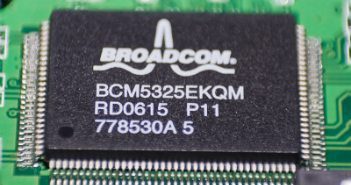Broadcom’s decision to exit the cellular baseband business means the company is giving up on the opportunity to ingegrate cellular modems with its highty successful connectivity chipsets for mobile devices.
Broadcom (BRCM) is giving up on its cellular baseband business. Baseband chips have helped catapult rival Qualcomm to a dominant position in the mobile chip market, but Broadcom’s attempt to get a piece of that action has not succeeded; the company’s market share remains below 5% despite an estimated $3 billion investment in the business. So now Broadcom has retained J.P. Morgan to explore alternatives for the business, including a potential sale. If Broadcom cannot sell the business, it will wind it down and write off the assets.
Part of Broadcom’s investment in LTE modems was its 2013 purchase of Renesas’s LTE assets for $164 million. At the time of the acquisition CEO Scott McGregor said, “Our LTE platform will leverage Broadcom’s rich connectivity portfolio and will deliver an optimized feature set for this fast growing market.”
“The rationale for Broadcom to invest in basebands had been to expand its connectivity business to mid-to-low range smartphones where a complete platform approach is relevant, allowing Broadcom to capture more dollar content while expanding in the high-end at the same time,” noted analyst Sravan Kundojjala of Strategy Analytics. “Broadcom feels its connectivity share in premium smartphones is relatively secure, thanks to its technology differentiation, strong customer relationships and quality of its products. In contrast to its connectivity chip business, Broadcom’s baseband chips were neither leading edge nor first to market. This situation left Broadcom in catch-up mode in basebands and only upcoming LTE SoCs and thin modems would have made it a high-end player in the baseband market.”
ARM, creator of the architecture used for most smartphone processors, is buying Ireland’s Duolog for an undisclosed amount. The British intellectual property powerhouse says it’s buying Duolog in response to “increasing SoC complexity.” Duolog’s Socrates platform configures IP in a standardized way, which should make ARM’s design process more efficient. ARM said that the purchase will extend its roadmaps for the mobile, enterprise and IoT markets.
ARM says it will ARM will continue to support Duolog’s the Socrates licensee base. The deal is expected to close during the third quarter.
Follow me on Twitter.

Chip news: What Broadcom loses by selling baseband business
ABOUT AUTHOR
